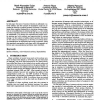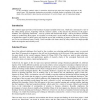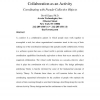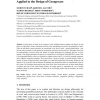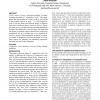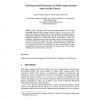215
click to vote
CHI
2011
ACM
14 years 5 months ago
2011
ACM
The field of HCI is growing, not only in the variety of application areas or the volume of research conducted, but also in the number of analytical approaches for use in the evalu...
101
click to vote
SAC
2002
ACM
15 years 1 months ago
2002
ACM
In this paper the issue of system evolution is addressed. Activity Theory and the concept of exapansive cycles are reviewed as theories to explain systemic evolution. Contradictio...
118
click to vote
ETS
2002
IEEE
15 years 1 months ago
2002
IEEE
In this concluding synthesis article, I summarize and discuss the papers that comprise both parts of this special issues. Two organizing frameworks are provided to facilitate read...
100
click to vote
CSCW
2002
ACM
15 years 1 months ago
2002
ACM
A coalition is a collaborative pattern in which people must work together to accomplish a task, but where organizational constraints stand in the way of their making use of the co...
114
click to vote
CSCW
2002
ACM
15 years 1 months ago
2002
ACM
Activity theory is based on the concept of tools mediating between subjects and objects. In this theory, an individual's creative interaction with his or her surroundings can ...
113
click to vote
CSCW
1998
ACM
15 years 6 months ago
1998
ACM
CSCW seems to have a persistent problem of understanding the nature of “cooperative work”. This paper argues that this problem is a direct result of not looking at the dynamic...
125
click to vote
WER
1999
Springer
15 years 6 months ago
1999
Springer
In this article we defend the idea that social aspects have strong influence in the software requirements elicitation (Goguen 1993), which drive us to find help in the social scien...
136
click to vote
CAEPIA
2003
Springer
15 years 7 months ago
2003
Springer
The development of software systems is a complex task that requires support techniques to guide the process and solve inconsistencies in its . In the agent paradigm, the use of soc...
106
click to vote
ICWL
2004
Springer
15 years 7 months ago
2004
Springer
Abstract. This paper calls on activity theory as tool for analyzing Asynchronous Learning Networks (ALN) to achieve a better understanding of their dynamics. This paper makes some ...
115
click to vote
IBERAMIA
2004
Springer
15 years 7 months ago
2004
Springer
Many approaches of the agent paradigm emphasize the social and intentional features of their systems, what are called social properties. The study of these aspects demands their ow...

